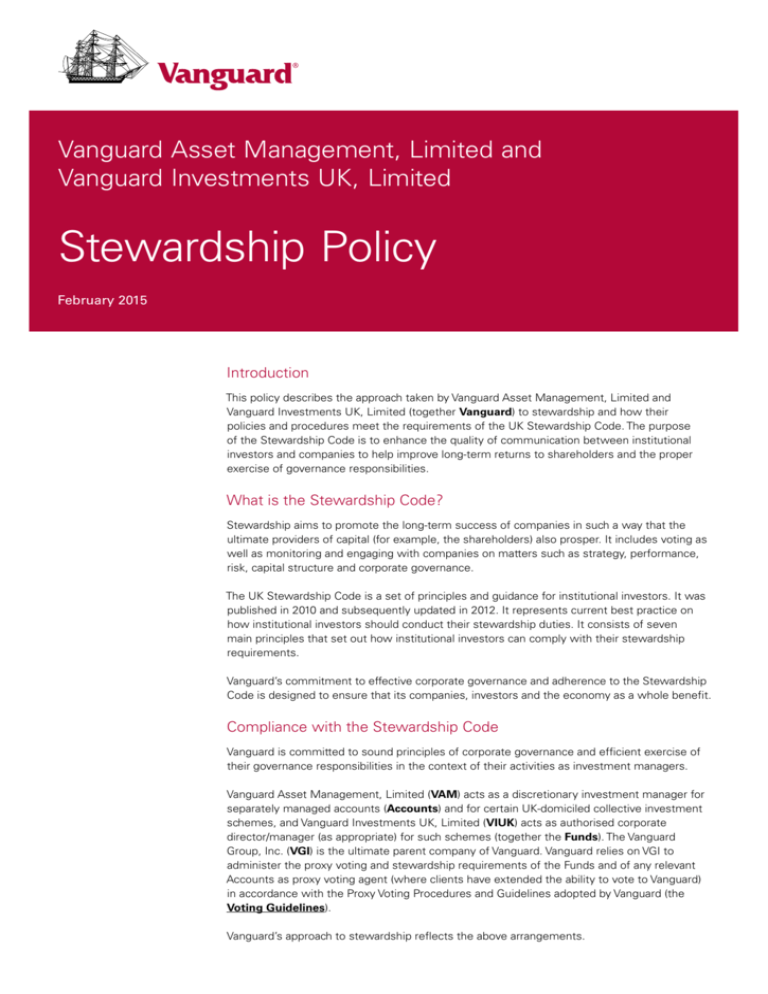
Vanguard Asset Management, Limited and
Vanguard Investments UK, Limited
Stewardship Policy
February 2015
Introduction
This policy describes the approach taken by Vanguard Asset Management, Limited and
Vanguard Investments UK, Limited (together Vanguard) to stewardship and how their
policies and procedures meet the requirements of the UK Stewardship Code. The purpose
of the Stewardship Code is to enhance the quality of communication between institutional
investors and companies to help improve long-term returns to shareholders and the proper
exercise of governance responsibilities.
What is the Stewardship Code?
Stewardship aims to promote the long-term success of companies in such a way that the
ultimate providers of capital (for example, the shareholders) also prosper. It includes voting as
well as monitoring and engaging with companies on matters such as strategy, performance,
risk, capital structure and corporate governance.
The UK Stewardship Code is a set of principles and guidance for institutional investors. It was
published in 2010 and subsequently updated in 2012. It represents current best practice on
how institutional investors should conduct their stewardship duties. It consists of seven
main principles that set out how institutional investors can comply with their stewardship
requirements.
Vanguard’s commitment to effective corporate governance and adherence to the Stewardship
Code is designed to ensure that its companies, investors and the economy as a whole benefit.
Compliance with the Stewardship Code
Vanguard is committed to sound principles of corporate governance and efficient exercise of
their governance responsibilities in the context of their activities as investment managers.
Vanguard Asset Management, Limited (VAM) acts as a discretionary investment manager for
separately managed accounts (Accounts) and for certain UK-domiciled collective investment
schemes, and Vanguard Investments UK, Limited (VIUK) acts as authorised corporate
director/manager (as appropriate) for such schemes (together the Funds). The Vanguard
Group, Inc. (VGI) is the ultimate parent company of Vanguard. Vanguard relies on VGI to
administer the proxy voting and stewardship requirements of the Funds and of any relevant
Accounts as proxy voting agent (where clients have extended the ability to vote to Vanguard)
in accordance with the Proxy Voting Procedures and Guidelines adopted by Vanguard (the
Voting Guidelines).
Vanguard’s approach to stewardship reflects the above arrangements.
The UK Stewardship Code sets out seven principles (the Principles), and institutional
investors, such as Vanguard, are required to comply with these or, to the extent that they do
not comply, explain why they do not do so.
The Principles state that institutional investors should:
1 Publicly disclose their policy on how they will discharge their stewardship responsibilities;
2 Have a robust policy on managing conflicts of interest in relation to stewardship, and this
policy should be publicly disclosed;
3 Monitor their investee companies;
4 Establish clear guidelines on when and how they will escalate their stewardship activities;
5 Be willing to act collectively with other investors where appropriate;
6 Have a clear policy on voting and disclosure of voting activity; and
7 Report periodically on their stewardship and voting activities.
Vanguard’s Stewardship Policy is part of its broader corporate governance policy. The
following overview summarises this policy and the Voting Guidelines by explaining how
Vanguard’s Stewardship Policy addresses each Principle.
The Principles
Principle 1: Publicly disclose their policy on how they will discharge their stewardship
responsibilities.
Vanguard and VGI’s duty to shareholders of the Funds is to maximise the long-term value of
the investments held by those Funds. Vanguard advocates effective corporate governance by
the companies in which the Funds invest because it believes that it is an important way to
enhance shareholder value. The board of the Funds and Vanguard (the Board) has adopted
the Voting Guidelines to govern proxy voting by each such Fund. The Board has delegated
oversight of proxy voting to the Proxy Oversight Committee (the Committee), comprising
senior officers of VGI. This Committee will report directly to the Board. Vanguard is subject
to the Voting Guidelines to the extent that the guidelines call for VGI to administer the voting
process and implement the resulting voting decisions.
The overarching objective in voting is simple: to support proposals and director nominees that
maximise the value of a Fund or Account’s investments – and those of fund shareholders –
over the long term. While the goal is simple, the proposals that the Funds receive are varied
and frequently complex. As such, the Voting Guidelines adopted by the Board provide a
rigorous framework for assessing each proposal. Under the guidelines, each proposal must
be evaluated on its merits, based on the particular facts and circumstances as presented.
For ease of reference, the Voting Guidelines often refer to all Funds. However, our policies
and practices seek to ensure that proxy voting decisions are suitable for each individual Fund.
For most proxy proposals, particularly those involving corporate governance, the evaluation
will result in the same position being taken across all of the Funds. In some cases, however,
Funds may vote differently, depending upon the nature and objective of each Fund, the
composition of its portfolio, and other factors. Accounts will be handled in a similar manner
(subject to the specific terms as agreed).
The Voting Guidelines incorporate factors the Committee should consider in each voting
decision. A Fund/Account may refrain from voting or vote in a certain way if that would be
regarded as being in the Fund’s and its shareholders’/such Account’s best interests. These
circumstances may arise, for example, when the expected cost of voting exceeds the
expected benefits of voting, or when exercising the vote would trigger trading, regulatory or
other restrictions.
In evaluating proxy proposals, VGI considers information from many sources, including, but
not limited to, the investment adviser, management or shareholders of a company presenting
a proposal, and independent proxy research services. We will give substantial weight to the
2
recommendations of the company’s board, absent guidelines or other specific facts that
would support a vote against management. In all cases, however, the ultimate decision rests
with the members of the Committee, who are accountable to each Fund’s board or the Board
of Vanguard (as appropriate) for Accounts.
While serving as a framework, the Voting Guidelines cannot contemplate all possible
proposals with which a Fund/Account may be presented. In the absence of a specific
guideline for a particular proposal (e.g. in the case of a transactional issue or contested
proxy), the Committee will evaluate the issue and cast the Fund’s vote in a manner that, in
the Committee’s view, will maximise the value of the investment, subject to the individual
circumstances of the Fund/Account.
Principle 2: Have a robust policy on managing conflicts of interest in relation to
stewardship and this policy should be publicly disclosed.
Vanguard and VGI maintain a rigorous policy so that conflicts of interest in the proxy voting
and corporate governance programme are addressed. The Board has delegated the dayto-day operations of the Funds’ proxy voting process to the VGI Proxy Voting Group, which
the Committee oversees. While most votes will be determined, subject to the individual
circumstances of each Fund, by reference to the Voting Guidelines as separately adopted
by each of the Funds, there may be circumstances when the Proxy Voting Group will refer
proxy issues to the Committee for consideration. Among the Proxy Voting Group’s functions
is to determine and address potential or actual conflicts of interest that may be presented
by a particular proxy and elevate such potential or actual conflicts to the Proxy Oversight
Committee.
The Proxy Oversight Committee does not include anyone whose primary duties include
external client relationship management or sales. This clear separation between the proxy
voting and client relationship functions is intended to eliminate any potential conflict of
interest in the proxy voting process. In the unlikely event that a member of the Committee
believes he or she might have a conflict of interest regarding a proxy vote, that member must
recuse himself or herself from the committee meeting at which the matter is addressed and
not participate in the voting decision.
We also have in place a Conflicts of Interest Policy which sets out what conflicts of interest
are, how they are identified and how Vanguard manages them. A Conflicts Register is
maintained and regularly updated in accordance with the Conflicts of Interest Policy.
Conflicts of interest is a key area in which Crew receive training. This is to ensure that
Crew recognise the issues they need to be aware of in order to identify any conflicts at an
early stage.
Principle 3: Monitor their investee companies.
VGI engages with the boards and management of investee companies with the objective of
maximising long-term shareholder value and Vanguard monitors this as part of their ongoing
oversight of VGI’s investment activity. However, due to the constantly evolving nature of
company practice and other circumstances, it is important to note that it is not possible to
provide assurance that all material or potential risks will be identified or addressed preemptively, although best endeavours will be exercised.
As discussed in “Vanguard’s approach to corporate governance” VGI believes that it is
important for company officials to communicate regularly with shareholders regarding
areas of interest or concern. In addition, shareholders should be provided with channels
through which they may communicate with the board. While boards receive shareholder
feedback through the proxy voting process, a “yes/no” vote provides only limited insight into
shareholder views. We have found, through hundreds of meetings and discussions annually,
that we can often accomplish more through dialogue than through the ballot.
3
Principle 4: Establish clear guidelines on when and how they will escalate their
stewardship activities.
It has not been VGI’s practice to make a public statement in advance of an AGM or EGM;
submit resolutions at shareholders’ meetings; or requisition an EGM. This is because it is
generally beyond each Fund or Account’s investment mandate as a passive index Fund/Account
to engage in such activities. That said, VGI actively engages with boards and management on
corporate governance matters appearing on AGM and EGM ballots. Matters discussed include
executive compensation; governance structures and practices; and pending transactions and
contests for board seats.
Principle 5: Be willing to act collectively with other investors where appropriate.
Vanguard and VGI act by reference to the investment strategy of the Funds/Accounts and
their own investment management policies. The decisions taken within that strategy and
those policies may be the same as those taken by other institutional investors in one or more
respects, but VGI has not collaborated with other institutional investors and Vanguard would
not require it to do so. Vanguard and VGI are willing to listen to other investors’ positions
on particular matters and regularly analyse and vote on shareholder proposals. Occasionally,
shareholder proposals against management’s recommendations may be supported when
Vanguard and VGI believe such votes are in the Funds’/Accounts’ best interests. Although this
approach is driven principally by the investment strategy and the investment management
policies, it also avoids the risks of acting in concert with other institutional investors.
Principle 6: Have a clear policy on voting and disclosure of voting activity.
VGI will provide Vanguard (as appropriate) with the Fund’s (or when appropriate, the Account’s)
proxy voting records each August for the 12 months ending on 30 June. Vanguard will review
this information and may ask for further details if necessary. Vanguard will publish its proxy
voting activities annually on its website (www.vanguard.co.uk).
For the policy on voting, please see the explanations provided above.
The Funds are permitted to engage in securities lending activity. All revenue generated from
securities lending goes back into the Fund. Securities lent may be recalled for voting purposes.
Principle 7: Report periodically on their stewardship and voting activities.
Vanguard seeks to maintain a clear record of its stewardship activities. VIUK will report to the
Board of each Fund annually with a summary provided by VGI of the Fund’s stewardship and
voting activities for the 12 months ending on 30 June. The board of Vanguard will receive a
summary provided by VGI of stewardship and voting activities for each Account as appropriate,
for the 12 months ending on 30 June. These reports will be published on our website (www.
vanguard.co.uk).
For further information on Vanguard’s approach to stewardship, please contact
corporategovernance@vanguard.com
Issued by Vanguard Asset Management Limited, which is authorised and regulated in the UK by the Financial Conduct Authority.
© 2015 Vanguard Asset Management, Limited. All rights reserved.





